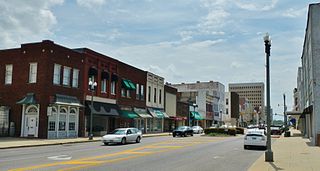
Anniston is the county seat of Calhoun County in Alabama, United States, and is one of two urban centers/principal cities of and included in the Anniston-Oxford Metropolitan Statistical Area. As of the 2010 census, the population of the city was 23,106. According to 2019 Census estimates, the city had a population of 21,287. Named "The Model City" by Atlanta newspaperman Henry W. Grady for its careful planning in the late 19th century, the city is situated on the slope of Blue Mountain.
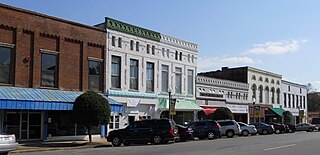
Talladega is the county seat of Talladega County, Alabama, United States. It was incorporated in 1835. At the 2020 census, the population was 15,861. Talladega is approximately 50 miles (80 km) east of one of the state’s largest cities, Birmingham.

Shawnee is an unincorporated community and post office in northern Park County, Colorado, United States, that is a historic district listed on the National Register of Historic Places (NRHP).

This is a list of the National Register of Historic Places listings in Talladega County, Alabama.
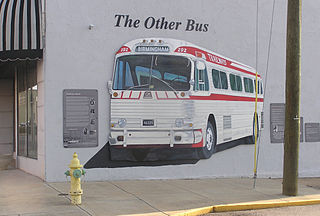
The Anniston–Oxford metropolitan statistical area is the second-most populated metropolitan area in Northeast Alabama, behind Huntsville. At the 2000 census, it had a population of 112,249. The MSA is anchored by significant jobs at Jacksonville State University, the Northeast Alabama Regional Medical Center, Stringfellow Hospital, the Anniston Army Depot, and the Department of Homeland Security at McClellan. McClellan has transitioned from being a closed military base, to becoming the home of hundreds of residents, new retail growth, and now more than 3,000 jobs spread out over more than 20 employers. Anniston remains strong in health care, legal, financial services and manufacturing. Oxford, with Interstate 20 running right through it, has developed a number of retail and restaurant establishments including the Oxford Exchange.
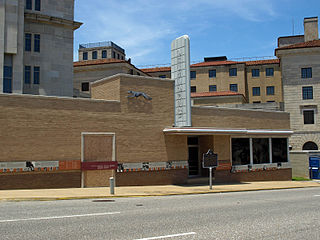
The Freedom Rides Museum is located at 210 South Court Street in Montgomery, Alabama, in the building which was until 1995 the Montgomery Greyhound Bus Station. It was the site of a violent attack on participants in the 1961 Freedom Ride during the Civil Rights Movement. The May 1961 assaults, carried out by a mob of white protesters who confronted the civil rights activists, "shocked the nation and led the Kennedy Administration to side with civil rights protesters for the first time."

The U.S. Post Office, also known as the Federal Building and Courthouse, is a historic government building in Anniston, Alabama, United States. It was listed on the National Register of Historic Places on November 13, 1976.
This is a list of the 26 multiple property submissions on the National Register of Historic Places in Alabama. They contain more than 288 individual listings of the more than 1,200 on the National Register in the state.

Temple Beth-El is a historic Reform Jewish congregation and synagogue, located at 301 East Thirteenth Street, in Anniston, Alabama, United States, in the United States. The synagogue was built in 1891 in the Romanesque Revival style.

Aderholdt's Mill was built about 1839 near Jacksonville, Alabama, United States. The 2+1⁄2-story brick mill is built in a hillside, originally with an overshot millwheel, replaced by an undershot turbine about 1936. It was built by Thomas Crutchfield for Thomas Riley Williams on an offshoot of Little Tallasseehatchie Creek for $2000, replacing a mill that had burned. It was sold in 1853 to James A. Stevenson. After a series of transactions the mill was purchased by James E. Aderholdt, who operated it with the new turbine until 1976. The mill and its machinery remain intact.

The Birmingham Civil Rights National Monument is a United States National Monument in Birmingham, Alabama established in 2017 to preserve and commemorate the work of the 1963 Birmingham campaign, its Children's Crusade, and other Civil Rights Movement events and actions. The monument is administered by the National Park Service. Civil rights protesters took to the streets of Birmingham, Alabama to fight in favor of Project C, a campaign against laws limiting African Americans freedoms. They were met with violent resistance from the police.

The Freedom Riders National Monument is a United States National Monument in Anniston, Alabama established by President Barack Obama in January 2017 to preserve and commemorate the Freedom Riders during the Civil Rights Movement. The monument is administered by the National Park Service. The Freedom Riders National Monument is one of three National Monuments that was designated by presidential proclamation of President Obama on January 12, 2017. The second was the Birmingham Civil Rights National Monument and the third, the Reconstruction Era National Historical Park, was re-designated as a National Historical Park on March 12, 2019.

The Samuel Noble Monument is a commemorative sculpture located at the parkway median of Quintard Avenue and 11th Street in the city of Anniston, Alabama, United States, and was erected in 1895 to honor the town's founder, Samuel Noble.
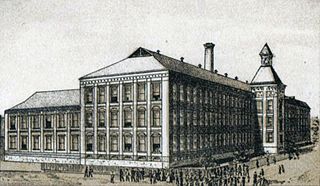
The Anniston Cotton Manufacturing Company was a cotton mill which operated from 1880 to 1977.
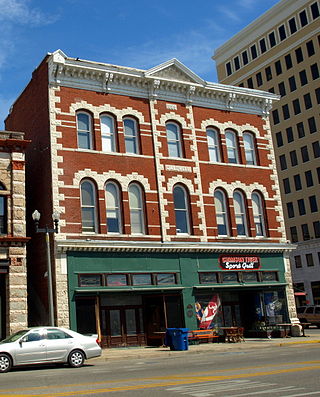
The Caldwell Building, at 1001 Noble St. in Anniston, Alabama, United States, is a historic building built in Italianate style in 1889. It was listed on the National Register of Historic Places in 1982.

The Bank of Anniston was a bank in Anniston, Alabama, United States, that failed in 1898. Its headquarters building, at 1005 Noble St. in Anniston, was built in 1888 and was listed on the National Register of Historic Places in 1985.

Kilby House, at 1301 Woodstock Ave. in Anniston, Alabama, United States, was built in 1914. It was listed on the National Register of Historic Places in 1985.
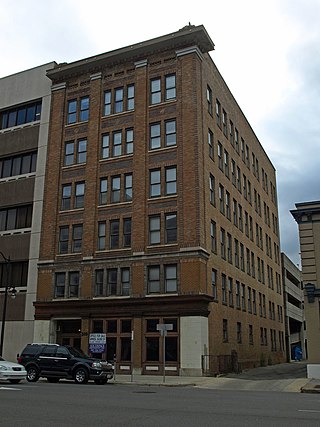
The Alabama Penny Savings Bank is a historic building built in 1913 at 310 18th Street North in Birmingham, Alabama, United States. The building has also been known as the Pythian Temple. Alabama Penny Savings Bank was the first black-owned bank in Alabama and financed construction of homes and churches for thousands of local black citizens. The bank was founded in 1890 and was the second largest black bank in the United States in 1907. The building was listed on the National Register of Historic Places in 1980.
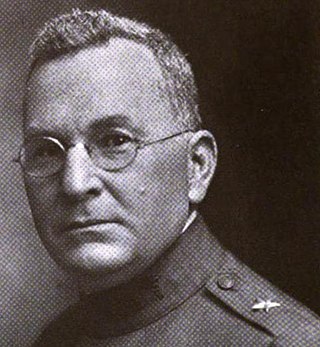
Robert E. Noble was an American physician and a career officer in the United States Army. A veteran of the Philippine–American War, United States occupation of Veracruz, World War I, and the Occupation of the Rhineland, he attained the rank of major general and was a recipient of the Army Distinguished Service Medal and French Legion of Honor (Commander).



















